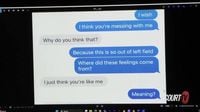Testimony continued on May 9, 2025, in the murder trial of Karen Read, who faces charges for allegedly backing her SUV into her boyfriend, Boston police officer John O’Keefe, and leaving him for dead. The trial has drawn significant public attention due to the circumstances surrounding O’Keefe's death and the contentious nature of the evidence presented.
State Police Sergeant Yuri Bukhenik returned to the witness stand, facing cross-examination from Read's attorney, Alan Jackson. During his testimony, Bukhenik was questioned about various aspects of the investigation, including a call made by ATF agent Brian Higgins at the Canton police station at 1:35 a.m. on January 29, 2022, the night of O’Keefe’s death. Bukhenik admitted he was unaware of that call, which Higgins testified was made after he left an afterparty at Fairview Road to move cars due to a snowstorm.
“We had the information that we had,” Bukhenik stated, emphasizing that authorities had access to both O’Keefe's and Read's phones for cross-referencing the accuracy of Higgins’s texts. He expressed confidence in the investigation, saying, “the honesty, cooperation of all the witnesses and corroborating, supporting facts spoke for themselves.”
During the examination, Jackson highlighted that O’Keefe had no broken bones except for skull fractures, suggesting the injuries were inconsistent with being struck by a vehicle. Bukhenik acknowledged that he was not a medical professional and did not conduct the autopsy, stating, “I did not know that.”
Jackson pressed Bukhenik on whether Higgins had mentioned he could not see O’Keefe’s body because it was covered by a snowbank. Bukhenik could not recall this detail but reiterated that Higgins was not being less than truthful in his account.
Further inquiries delved into communications between Higgins and another individual, Brian Albert, around 2:22 a.m. on January 29, 2022. Bukhenik stated he was unaware of these calls, which surfaced during a separate federal investigation into the state law enforcement's handling of O’Keefe's death. This investigation concluded without any charges being filed.
Text messages exchanged between Read and Higgins were also scrutinized as they were read aloud in court. The messages, which displayed a flirtatious tone, were presented by the defense to suggest that individuals at the afterparty may have had motives to harm O’Keefe. Bukhenik characterized Read’s communications with Higgins as indicative of an “angry girlfriend trying to set up a hookup,” suggesting that she may have been seeking revenge on O’Keefe.
Among the messages, Higgins asked Read, “What do you want from me?” and she responded, “I’d like to hang out but that you’re giving me the Heisman,” implying he was keeping her at arm’s length. The exchanges included playful banter, with Higgins referring to Read as “hot” and “smart,” and they discussed their mutual attraction.
In one notable exchange, Read expressed frustration with her relationship with O’Keefe, stating, “we have no intention of EVER getting married.” She also mentioned her struggles with helping O’Keefe’s niece and nephew, telling Higgins, “I spread myself too thin and sometimes it’s thankless.”
As the trial progressed, Bukhenik was pressed about the recovery of evidence from the scene, including taillight fragments and other debris. He confirmed that more than 40 pieces of Read’s taillight were found during multiple searches of the area, although he could not document the exact locations where each item was discovered.
Jackson highlighted discrepancies in the evidence collection process, questioning Bukhenik on the timing of when items were formally booked into evidence. Bukhenik acknowledged that some items were not sent to the crime lab until March 14, 2022, weeks after the initial searches.
In a dramatic moment, Bukhenik stated, “the evidence was speaking to us” during the investigation, suggesting that the physical evidence collected pointed to a narrative of events leading to O’Keefe’s death. However, Jackson challenged him on the lack of precise documentation, asking, “You didn’t see the need to document the exact coordinates where the pieces were found?”
Bukhenik insisted that the general vicinity was sufficient for the investigation, but Jackson's questioning raised doubts about the thoroughness of the evidence-gathering process.
As the trial continues, the tension surrounding the case remains palpable, with both the prosecution and defense presenting their narratives of the events leading to O’Keefe’s tragic death. The outcome of the trial may hinge on the credibility of the evidence and the interpretations of the messages exchanged between the involved parties.
In the courtroom, emotions ran high as the jury listened to the intimate details of Read's communications with Higgins, which some believe could influence their perception of her motives. The case encapsulates a complex web of relationships, jealousy, and tragedy that has captivated the public's attention.
As the cross-examination unfolds, the jury must navigate the murky waters of evidence and testimony, weighing the implications of each piece of information presented. The trial is set to resume, with further testimonies expected to shed light on the circumstances surrounding John O’Keefe's death and Karen Read's alleged involvement.





